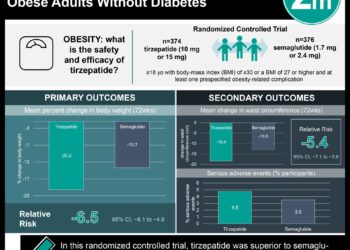Parent/child feeding practices associated with weight status
1. Survey results indicated that parents were significantly more likely to pressure their child to eat more at meals when the parent and the child were both not overweight.
2. Parents were also significantly more likely to restrict their child’s food intake when both the parent and child were classified as overweight.
Study Rundown: Adolescent obesity in the United States remains a major public health concern with a known linkage to health problems in adulthood (hypertension, cardiovascular disease, and diabetes). While previous research has investigated adolescent and parent weight concordance, prior studies have not explored the possible relationship between parental/child weight status and parental feeding practices (parents encouraging food restriction or pressuring child to eat). Authors of the current study sought to examine this potential link and to understand if feeding practices were associated with a single parent’s weight status, both parents, or the child’s status. Results of this cross-sectional study revealed parental attempts to encourage adolescent food consumption when both the child and the parents were both not overweight. Parents were also more inclined to limit food intake in their child when both the parent and child were overweight. This study may be limited as parental BMI was self-reported and the cross-sectional design does not allow for the examination of longitudinal associations. However, results may aid healthcare providers in the identification of at-risk parent/child combinations which are more likely to influence adolescents toward unhealthy behaviors.
Click to read the study, published today in Pediatrics
Relevant Reading: Childhood overweight and the relationship between parent behaviors, parenting style, and family functioning
In-Depth [cross-sectional study]: The survey data from 3252 parents and 2153 adolescents were obtained from 2 population-based studies (Eating and Activity in Teens 2010 & Families and Eating and Activity in Teens). Adolescent height and weight were obtained for BMI calculations, which were categorized into non-overweight and overweight. Parenting food practices (pressure-to-eat and food restriction) were assessed based upon a modified version of the Child Feeding Questionnaire. An overall pressure-to-eat and food restriction score (1= low, 4= high) was created by averaging parental responses to all associated questions. Significantly higher pressure-to-eat scores were recorded by parents when adolescents and parents were both non-overweight (mean 2.35; 95% CI 2.29- 2.42) compared to when parents and adolescents were in different weight classes (mean 2.26, 95% CI 2.21- 2.30; mean 2.06, 95% CI 1.97- 2.14), and also when both parents and adolescents were overweight (mean 2.04; 95% CI 1.99- 2.10) (p < 0.05). Significantly higher average scores were reported by parents for food restriction when both parents and adolescents were overweight (mean 2.74; 95% CI 2.67- 2.80) compared to when parents and adolescents were in opposing weight categories (mean 2.42, 95% CI 2.36; mean 2.56, 95% CI 2.46- 2.67), or when all were non-overweight (mean 2.36, 95% CI 2.30- 2.43) (p < 0.05).
Image: PD
©2015 2 Minute Medicine, Inc. All rights reserved. No works may be reproduced without expressed written consent from 2 Minute Medicine, Inc. Inquire about licensing here. No article should be construed as medical advice and is not intended as such by the authors or by 2 Minute Medicine, Inc.







